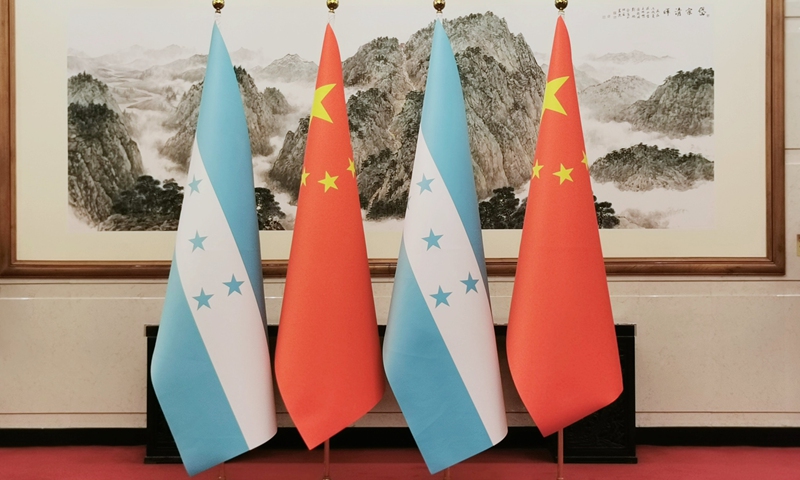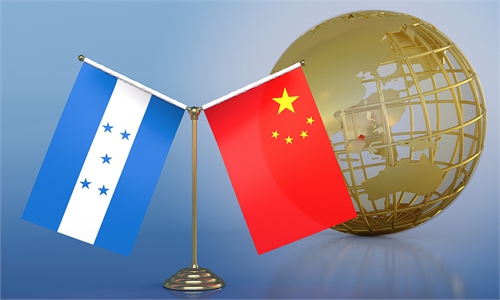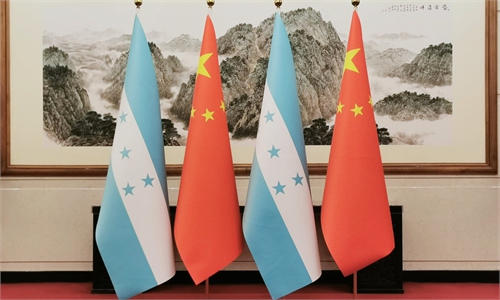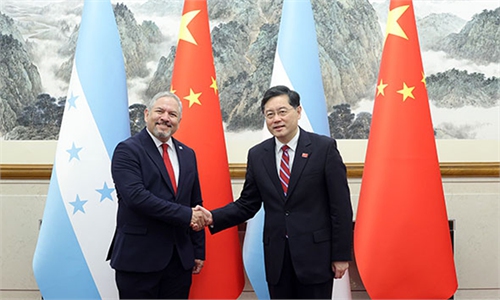
China and Honduras
China and Honduras established diplomatic ties on Sunday morning, shortly after Tegucigalpa announced that it had severed "diplomatic relations" with the Taiwan island.The timing is telling. Taiwan leader Tsai Ing-wen will travel from March 29 to April 7, stopping first in New York before heading to two Central American countries of Guatemala and Belize and traveling through Los Angeles on the return leg. The trip will include a meeting with US House Speaker Kevin McCarthy, which will undoubtedly jeopardize peace in the Taiwan Straits.
Pan Deng, executive director of the Latin American and Caribbean Region Law Center of China University of Political Science and Law, told the Global Times that in face of the establishment of diplomatic relations between China and Honduras, the collusion between the US and the Taiwan secessionist forces is increasingly ironic.
Honduras is the ninth "diplomatic ally" that has broken ties with the Taiwan island since pro-independence Democratic Progressive Party and Tsai took office in May 2016. Regarding the issue of "allies breaking ties," Taiwan has no ability to bargain at all. So the island has pinned its hope on the US.
The US did send a delegation to Honduras, including US Special Presidential Adviser for the Americas Chris Dodd, to impose pressure on it. Despite that, Honduras stayed firm on its decision of establishing formal diplomatic ties with China. The US government ended up acknowledging it "respects" Honduras' decision.
This shows the US maneuver is in vain. The US does not have enough resources to assist Honduras or make any effective pledges to Honduras in exchange for Honduras' change of mind. The case of Honduras shows that as long as countries stay firm, US obstruction and interference will not work. This will have a domino effect on Taiwan's remaining "allies" such as Guatemala, Belize and Paraguay. Guatemala and Belize are exactly the two countries where Tsai is heading for.
Tsai has been touting Taiwan's "international" space, and has even made her Central American trip a high-profile one in a bid to show the stable relations Taiwan has with them and highlight US support behind it. But the fact that Taiwan just lost an "ally" right before Tsai seeks to claim her "diplomatic" triumph during her trip has made the collusion between the US and the Taiwan island more of a laughing stock, said Pan.
Former US president Donald Trump on March 26, 2020 signed into law the TAIPEI Act, which aimed at strengthening US commitment to protecting Taiwan's "international" standing and encouraging countries to support Taiwan's "diplomatic" recognition. The US attempts to use its influence to threaten and coerce the island's remaining "allies" not to break ties with Taiwan. But it has been proven that more and more countries and regions are resentful about US manipulation of Taiwan-related affairs.
Some youngsters in the Taiwan island who have "diplomatic" aspirations have lost confidence in careers in "diplomacy" because Taiwan's "diplomatic" ties may gradually disappear in the future. Honduras' cutting off ties is another tremendous shock to them.
Zhang Hua, a research fellow at the Institute of Taiwan Studies, Chinese Academy of Social Sciences, told the Global Times that there is a possibility that Taiwan would give up its effort to maintain its "diplomatic relations," as sustaining such relations is actually a massive financial investment. Zhang noted that Taiwan's secessionist forces in the future may move even closer to the US, colluding with NATO as well as some Central and Eastern European countries under the banner of democracy.
Taiwan's secessionist forces blindly believe in US support as their backup force to confront the Chinese mainland. However, they are nothing more than a pawn to contain China in the eyes of the US. This proves that US-Taiwan collusion is not really sustainable. After former house speaker Nancy Pelosi's Taiwan visit in August last year, the mainland's attitude toward Taiwan secessionist forces has become increasingly hardened. Washington engages in opportunistic and adventuristic strategy to back up the Taiwan secessionist forces. The two will only end up setting fire to themselves. The mainland's military power is increasing as its comprehensive strength grows, making the deterrence against the US and Taiwan secessionist forces more real.
The author is a reporter with the Global Times. opinion@globaltimes.com.cn



